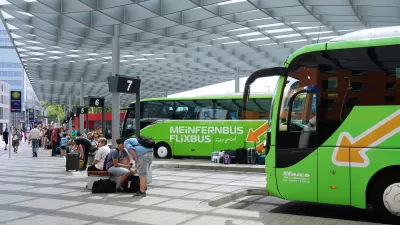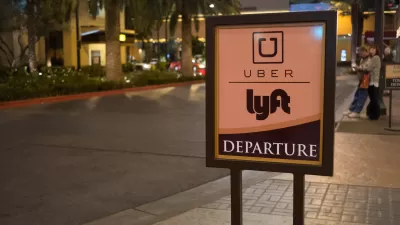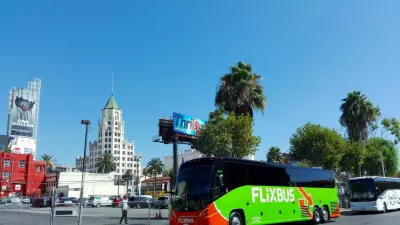Greyhound will soon have a new competitor, with an Uber-like business model and a history of fast growth.

A new competitor is coming to the U.S. intercity bus industry. Flixbus has not changed the standard for service in intercity buses, yet "Flixbus is the hottest thing in Europe’s long-haul bus business: It boasts 200,000 cheap, daily connections to more than 1,200 destinations in 26 countries, carrying 30 million passengers in 2016," Laura Biss writes for CityLab. The service's innovations are more in the structure of the company: "As Uber does not own its on-demand cars, Flixbus does not own its buses. Instead, they are operated by other bus companies Flixbus has franchised or absorbed," Bliss reports.
From a customer perspective the company offers familiarity in an industry that often lacks that attribute. "This is part of Flixbus’ inherent value, from both a franchising and marketing standpoint, Schwieterman said: 'If you travel to another region, instead of stepping on a bus company you’ve never heard of, you recognize the brand,'" Bliss writes.
Flixbus is not yet profitable, but as they acquire more competitors they control a growing share of the market and may be able to raise prices. Flixbus executives argue that no matter how consolidated the bus market becomes they won't have a monopoly. In the United States the dynamic is different, as Greyhound remains the entrenched power, despite some flaws in its reputation.
FULL STORY: Europe's Intercity Bus Juggernaut Is Rolling Into the U.S.

Maui's Vacation Rental Debate Turns Ugly
Verbal attacks, misinformation campaigns and fistfights plague a high-stakes debate to convert thousands of vacation rentals into long-term housing.

Planetizen Federal Action Tracker
A weekly monitor of how Trump’s orders and actions are impacting planners and planning in America.

Chicago’s Ghost Rails
Just beneath the surface of the modern city lie the remnants of its expansive early 20th-century streetcar system.

Bend, Oregon Zoning Reforms Prioritize Small-Scale Housing
The city altered its zoning code to allow multi-family housing and eliminated parking mandates citywide.

Amtrak Cutting Jobs, Funding to High-Speed Rail
The agency plans to cut 10 percent of its workforce and has confirmed it will not fund new high-speed rail projects.

LA Denies Basic Services to Unhoused Residents
The city has repeatedly failed to respond to requests for trash pickup at encampment sites, and eliminated a program that provided mobile showers and toilets.
Urban Design for Planners 1: Software Tools
This six-course series explores essential urban design concepts using open source software and equips planners with the tools they need to participate fully in the urban design process.
Planning for Universal Design
Learn the tools for implementing Universal Design in planning regulations.
planning NEXT
Appalachian Highlands Housing Partners
Mpact (founded as Rail~Volution)
City of Camden Redevelopment Agency
City of Astoria
City of Portland
City of Laramie





























